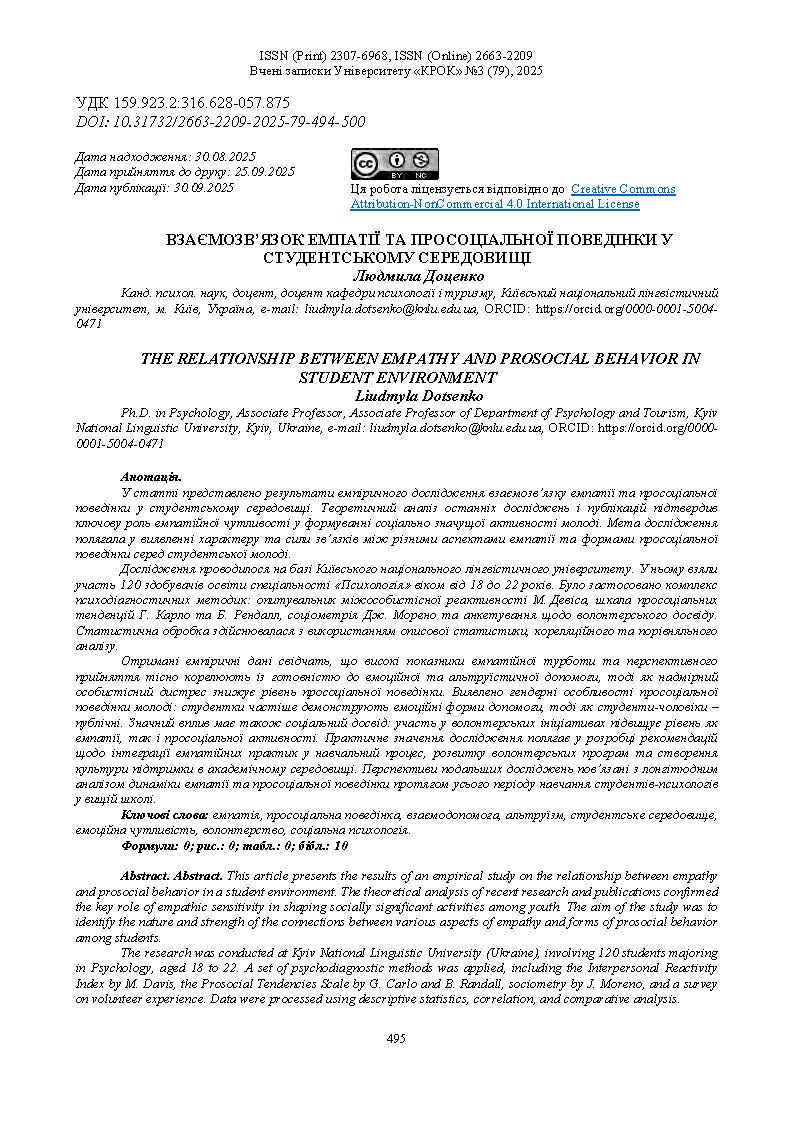ВЗАЄМОЗВ’ЯЗОК ЕМПАТІЇ ТА ПРОСОЦІАЛЬНОЇ ПОВЕДІНКИ У СТУДЕНТСЬКОМУ СЕРЕДОВИЩІ
DOI:
https://doi.org/10.31732/2663-2209-2025-79-495-500Ключові слова:
емпатія, просоціальна поведінка, взаємодопомога, альтруїзм, студентське середовище, емоційна чутливість, волонтерство, соціальна психологіяАнотація
У статті представлено результати емпіричного дослідження взаємозв’язку емпатії та просоціальної поведінки у студентському середовищі. Теоретичний аналіз останніх досліджень і публікацій підтвердив ключову роль емпатійної чутливості у формуванні соціально значущої активності молоді. Мета дослідження полягала у виявленні характеру та сили зв’язків між різними аспектами емпатії та формами просоціальної поведінки серед студентської молоді.
Дослідження проводилося на базі Київського національного лінгвістичного університету. У ньому взяли участь 120 здобувачів освіти спеціальності «Психологія» віком від 18 до 22 років. Було застосовано комплекс психодіагностичних методик: опитувальник міжособистісної реактивності М. Девіса, шкала просоціальних тенденцій Г. Карло та Б. Рендалл, соціометрія Дж. Морено та анкетування щодо волонтерського досвіду. Статистична обробка здійснювалася з використанням описової статистики, кореляційного та порівняльного аналізу.
Отримані емпіричні дані свідчать, що високі показники емпатійної турботи та перспективного прийняття тісно корелюють із готовністю до емоційної та альтруїстичної допомоги, тоді як надмірний особистісний дистрес знижує рівень просоціальної поведінки. Виявлено гендерні особливості про соціальної поведінки молоді: студентки частіше демонструють емоційні форми допомоги, тоді як студенти-чоловіки – публічні. Значний вплив має також соціальний досвід: участь у волонтерських ініціативах підвищує рівень як емпатії, так і просоціальної активності. Практичне значення дослідження полягає у розробці рекомендацій щодо інтеграції емпатійних практик у навчальний процес, розвитку волонтерських програм та створення культури підтримки в академічному середовищі. Перспективи подальших досліджень пов’язані з лонгітюдним аналізом динаміки емпатії та просоціальної поведінки протягом усього періоду навчання студентів-психологів у вищій школі.
Завантаження
Посилання
Batson, C. D. (2011). Altruism in humans. Oxford University Press.
Carlo, G., & Randall, B. A. (2002). The development of a measure of prosocial behaviors for late adolescents. Journal of Youth and Adolescence, 31 (1), 31–44. https://doi.org/10.1023/A:1014033032440)
Carlo, G., Hausmann, A., Christiansen, S., & Randall, B. A. (2003). Sociocognitive and Behavioral Correlates of a Measure of Prosocial Tendencies for Adolescents. Faculty Publications, Department of Psychology. 4. https://digitalcommons.unl.edu/psychfacpub/4
Davis, M. H. (2018). Empathy: A social psychological approach. Westview Press.
https://doi.org/10.4324/9780429493898
Decety, J., & Cowell, J. M. (2014). The complex relation between morality and empathy. Trends in Cognitive Sciences, 18 (7), 337–339. https://doi.org/10.1016/j.tics.2014.04.008
Eisenberg, N., & Miller, P. A. (1987). The relation of empathy to prosocial and related behaviors. Psychological Bulletin, 101 (1), 91–119. https://doi.org/10.1037/0033-2909.101.1.91
Eisenberg, N., & Spinrad, T. L. (2014). Multidimensionality of prosocial behavior: Rethinking the conceptualization and development of prosocial behavior. In L. M. Padilla-Walker & G. Carlo (Eds.), Prosocial development: A multidimensional approach (pp. 17–39). Oxford University Press. https://doi.org/10.1093/acprof:oso/9780199964772.003.0002
Rogers, C. R. (1959). A theory of therapy, personality, and interpersonal relationships, as developed in the client-centered framework. Psychology: A Study of a Science, 3, 184-256.
https://www.beeleaf.com/wp-content/uploads/2017/09/rogers_chapter_in_koch-1.pdf
Балашов, Е. М. (2014). Психологічні особливості соціальної емпатії студентів як засіб самореалізації. Наукові записки Національного університету “Острозька академія”. Серія «Психологія і педагогіка», (28), 28–39.
https://eprints.oa.edu.ua/id/eprint/3654/1/5.pdf
Бугайова, Н., & Андрющенко, І. (2021). Розвиток емпатії студентів-психологів як складової майбутньої професійної діяльності. Теоретичні і прикладні проблеми психології, 55 (2), 5–17.

Downloads
Опубліковано
Як цитувати
Номер
Розділ
Ліцензія

Ця робота ліцензується відповідно до Creative Commons Attribution-NonCommercial 4.0 International License.

